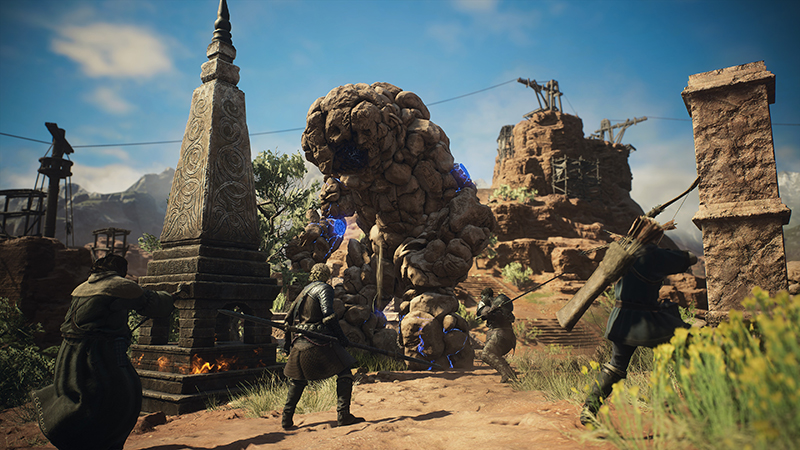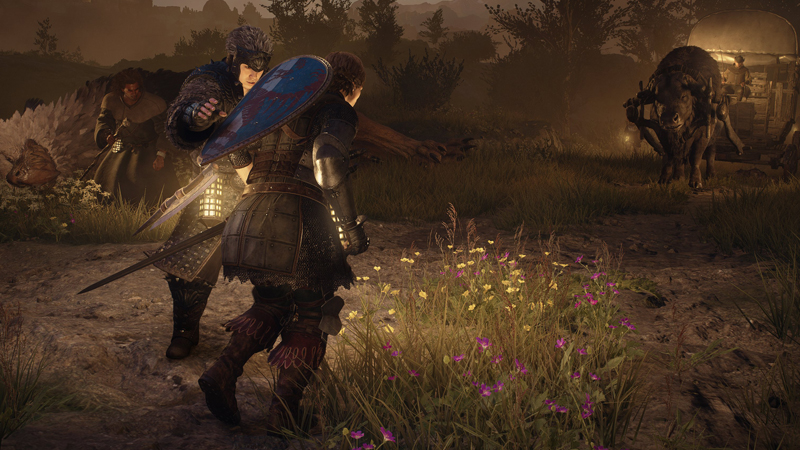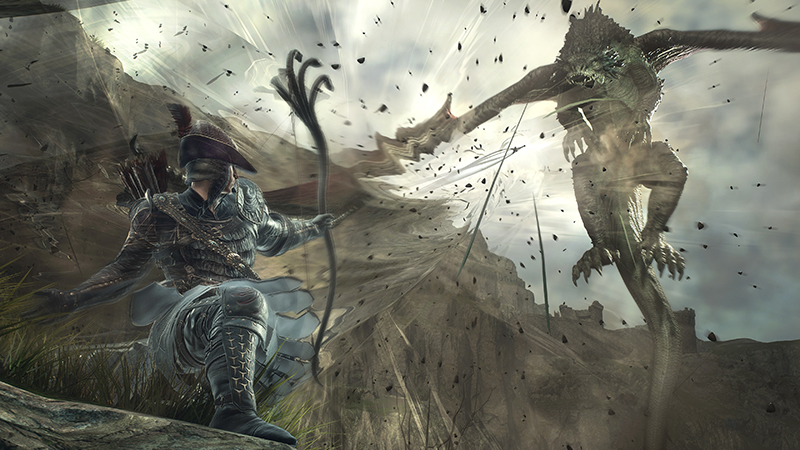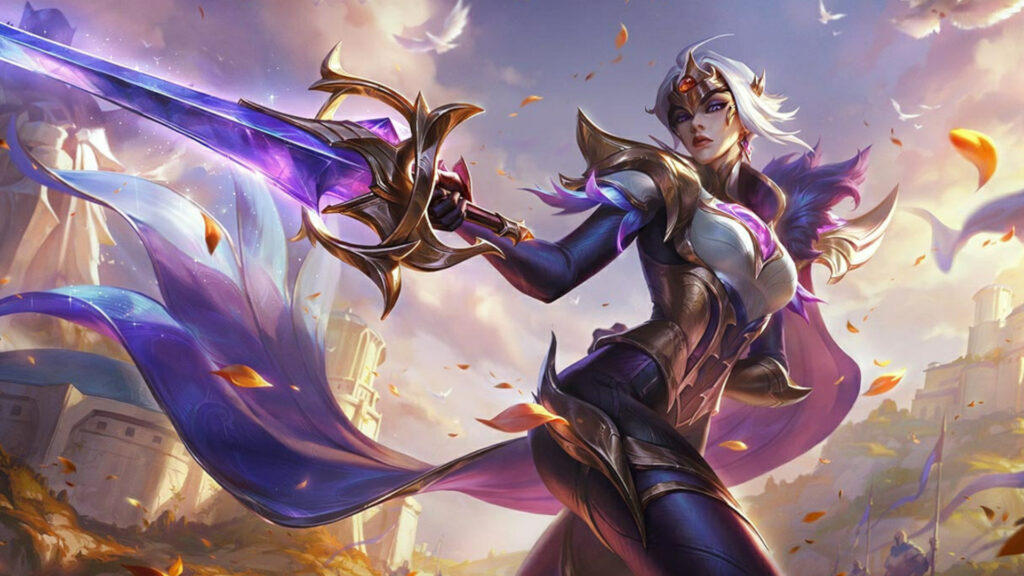Dragon’s Dogma Classes – In-Depth Vocations Guide
As an action role-playing adventure series, Dragon’s Dogmas features a somewhat standard character class system. The classes, referred to in-game as ‘Vocations,’ are assigned to the Arisen player character and the companion Pawns. They determine the characters’ playstyles, the roles each unit must play in battle along their journey, and the weapons they will wield.

Credit: X | @DragonsDogma
Vocations across the series are divided into 3 tiers: Basic/Starting, Advanced, and Hybrid. As Dragon Dogma’s 2 release date approaches, the following guide will inform you about each of Dragon’s Dogma’s classes to give you that much-needed edge.
Basic/Starting Classes in Dragon’s Dogma
This self-explanatory set of vocations is assigned to the Arisen at the start of their journey and to the Pawns upon acquisition. These are; Fighters, Mages, and Striders (split into Thieves and Archers in Dragon’s Dogma 2 Classes).
- Fighter – Equipped with a One-handed Sword and Supporting Shield. Primarily serving as the party’s frontline, Fighters serve to strike first and draw enemy attention away from the rest of the team. While they boast decent offensive and defensive capabilities, fighters are greatly limited in terms of mobility and range.
- Mage – Equipped with Magick Staff. Mages specialize in casting enchantments upon the team, such as healing boons to keep members from dying off in battle and buffs that boost weapon damage and provide a few extra layers of protection. While blessed with good magical offense and defense, they prefer to avoid direct contact with enemies due to their relatively low resistance to physical damage
- Strider – Equipped with Daggers and Shortbows. Striders specialize in making quick work of any enemy in as little time as possible. Armed with daggers, they can deal rapid but deadly blows to unsuspecting enemies in melee range. Otherwise, they can keep their distance and engage combatants with fast volleys from their shortbows.

Advanced Vocations in Dragon’s Dogma
Either by spending Discipline points in the first game or by completing a particular quest in the sequel, the Arisen and Pawns can fulfill the requirements for Advanced vocations. These can be regarded as upgraded versions of the basic vocations and include; Warriors, Sorcerers, and Rangers (not included in Dragon’s Dogma 2 Classes)
- Warrior – Equipped with a Two-handed Greatsword or Hammer. What they lack in fighters’ defense, Warriors make up for in huge amounts of damage and physical constitution. Relying on their armor, they can forgo the use of shields and focus more on delivering crushing blows to enemies. Warriors also gain elements of crowd control ranging from wide-sweeping skill attacks to stunning strikes.
- Sorcerer – Equipped with Archistaff. Vast improvement on Mages, Sorcerers decimate the battlefield using destructive magic spells from a considerable range. They specialize in dealing elemental damage over wide areas of effect, with the caveat of requiring more time to chant and cast said spells with the risk of exposure to approaching enemies. Due to this, like Mages, Sorcerers must avoid direct engagements with foes as much as possible.
- Rangers – Equipped with Longbows and Daggers, Rangers specialize in dealing high damage from long range. Unlike Striders and Archers, they wield Longbows, which grant damage over long distances at the cost of increased charge time and reduced mobility during draws. Rangers are not completely helpless at close range as they are armed with daggers but without dagger skills; much like the Strider class, they rely on light armor to allow for increased mobility between attacks.

Credit: X | DragonsDogma
Hybrid Vocations in Dragon’s Dogma
Hybrid vocations are combined aspects of two of the three basic vocations and are made exclusively for the Arisen. These vocations grant players access to some of the most powerful gear in the games. It should be noted that the hybrid set in the sequel differs significantly from that of the first game due to a few changes in vocation structure and the inclusion of an all-new vocation. Dragon’s Dogma’s hybrid vocations are; Mystic Knight, Magick Archer, and Assassin. Dragon’s Dogma 2’s exclusive hybrid vocations are; Mystic Spearhand, Trickster, and Warfarer.
- Mystic Knight – Equipped with Sword/Staff/Mace and Magick shield. Capable of dominating the frontline even in the toughest of battles, Mystic Knights are a perfect balance between the physical prowess of fighters and the far-reaching Magick capabilities of Mages. They are highly capable of providing strong offense, defense, and support for the party.
- Magick Archer – Equipped with Daggers, Staff, and Magick Bow. The combined aspects of Strider and Mage grant Magick Archers a mix of mobility, range, and pure magic damage. They can wield Magick Bows which have the distinct advantage of never missing their targets with the use of Magick arrows. These superior arrows can also be elementally augmented, giving players more options for exploiting enemy weaknesses.
- Assassin – Equipped with Sword, Shield, Daggers, and Bow. Combining the strength of Fighters and the nimble quick-footedness of Striders, the aptly named Assassins can rip through foes without ever giving them a chance to retaliate. They are capable of wielding any combination of the four primary non-magical weapons with greater efficiency than their component aspects. Assassins also possess special skills that allow for solo nighttime adventures.
- Mystic Spearhand – Equipped with Duospear. While similar to Mystic Knights, Mystic Spearhands excel at both close and ranged combat. But unlike its previous counterpart, the class grants players access to a specialized weapon called the Duospear, capable of multi-hitting far-reaching strikes.
- Trickster – Equipped with Censer. Introduced in the second game, Tricksters achieve victory by creating illusions on the battlefield using their incense-filled censers. These illusions distract or disrupt enemy units, thereby giving the adventures advantageous options in a fight. Tricksters are also capable of granting powerful buffs to pawns, taking their strengths past their usual limits.
- Warfarer – Equipped with any combination of three weapons, they are the newest and most versatile addition to the roster of vocations. It combines aspects of all basic vocations like a Jack-of-all-trades class. Players who choose this vocation can freely adapt their playstyle to any situation. The class may have restrictions on skill levels, requiring players to exercise their skills in using the vocation.
With all this in mind, it should be easier to pick the best Dragon’s Dogma class tailored to you. Feel free to experiment with different team compositions along your journey through Dragon’s Dogma. People familiar with games like Dragon’s Dogma will surely enjoy this thrilling release set to introduce a whole new experience.
Read next: Is Dragon’s Dogma 2 Multiplayer? - All You Need to Know















